-
2024 Report
2024 Report: State of implementation
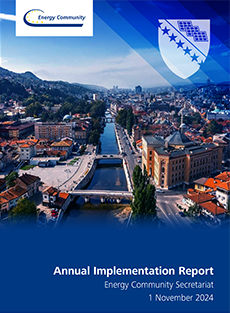
”Overall, the implementation performance across the Energy Community appears stable. Considering the growing scope of the acquis, the slight implementation decline indicates a tendency toward steady transposition and implementation,” said Artur Lorkowski, Director of the Energy Community Secretariat.
The Report highlights connection between the realisation of the Energy Community objectives and the EU financial support for the Contracting Parties through the New Growth Plan for the Western Balkans and the Ukraine Facility. Key focus area includes the transposition of the Energy Integration Package (EIP), advances in strategic energy infrastructure, and progress in decarbonisation and carbon pricing mechanisms.
-
2023 Report
2023 Report: State of implementation
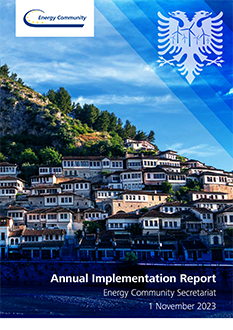
This year’s Implementation Report features a number of changes, most notably a clustering of the areas which matter for the Energy Community: Markets and Integration, Decarbonising the Energy Sector, Ensuring Energy Security, Improving the Environment and Performance of the Authorities.No Contracting Party was able to improve its overall implementation score during the reporting period. Among other factors, the relative changes in the Contracting Parties’ implementation performance compared to last year are due to the entry into force of parts of the Clean Energy Package at the end of 2022, namely in the areas of governance, renewable energy and energy efficiency. The upcoming challenge of transposing and implementing the Electricity Integration Package, due by the end of 2023, is not yet reflected in the weighting.
In 2023, Serbia emerged as the top performer, followed by Montenegro and Ukraine. In the most difficult circumstances, Ukraine and Moldova have advanced their impressive track-record on electricity and gas market reforms. For all Contracting Parties, the expectations to catch up during 2024 are high. -
2022 Report
2022 Report: State of implementation
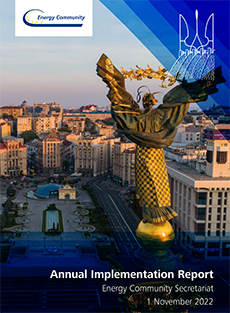
The reporting year 2022, the most challenging so far in the history of the Energy Community, turned out to be a true turning point for the energy sectors of its Contracting Parties. The organization is adapting to this challenge and will have to adapt further. Granting EU candidacy status to Ukraine and Moldova and clear recommendation by the European Commission to grant this status to Bosnia and Herzegovina brings the Energy Community to the heart of the enlargement process.
As a response to the surge in electricity import prices, other countries prioritized stabilization measures, and are yet to take the decisive steps which will allow them to yield the full benefits of domestic reforms. In Albania, Georgia, Kosovo*, Montenegro and North Macedonia further steps towards the establishment of spot markets in electricity have been made but are yet to materialize. Serbia still needs to liberalize its gas sector whereas North Macedonia made progress in the better usage of its interconnector with Bulgaria. The development in Bosnia and Herzegovina remains stalled.
The implementation of environmental law, both in terms of pollution standards and in the quality of permitting procedures remains a concern as reflected in a number of infringement procedures. At the same time, all Contracting Parties progress in the transposition of the Clean Energy Package, in particular the Renewable Energy and Energy Efficiency Directives. Auctions for market-based renewable energy support progressed in Albania as well as North Macedonia. -
2021 Report
2021 Report: State of implementation
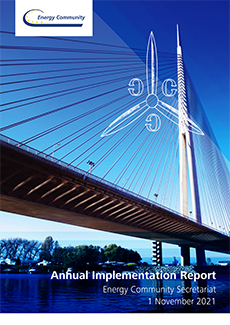
As the energy crisis loomed, we have seen in some days the highest electricity prices in Europe recorded on the day-ahead market in Serbia which is not yet coupled. This proved that small isolated markets are more prone to price volatility and that their integration at regional and pan-European level was never more pertinent.
The same goes for the decarbonisation path the Energy Community has been embarking on in the footsteps of the Green Deal. An increasing number of Contracting Parties have formally or implicitly accepted that coal and lignite have no future in their energy mix in the mid-term. The full potential of renewable energy is tapped where a stable legal framework and competitive auctions for market-based support schemes have been implemented. Several Contracting Parties have adopted climate laws while carbon pricing – arguably the most effective instrument in the Green Deal’s regulatory toolbox – has remained a rare exemption.
The rather reluctant endorsement of decarbonisation and the alignment of policies and measures with the European Union’s may be choked off by reactions to the energy price surge where governments do not stay the course. For now, domestic lignite and coal-generated power are again in high demand. What matters is that the Contracting Parties do not lose sight of the decarbonization objective in this situation, and follow the transition trail blazed by the European Union. -
2020 Report
2020 Report: State of implementation
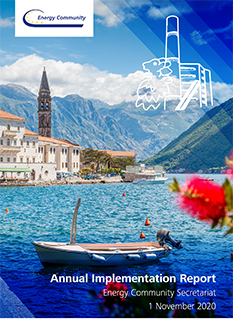
There are plenty of indications that the Energy Community is not stagnating but actually moving forward on the path of energy transition, and has in some cases passed the point of no return. Without a legal obligation to do so, many Contracting Parties are currently engaging in drafting integrated energy and climate plans in line with the Governance Regulation of the Clean Energy Package. Without participating in the EU’s emission trading scheme, Montenegro has developed and launched its own cap-and-trade system. With the Energy Community’s acquis on reducing pollution from coal-fired power plants not yet respected, air pollution became an important issue of public concern in many Contracting Parties. Despite not adhering to the Paris Agreement, the use of coal came closer to being abandoned in Kosovo* with the failure of the Kosovo e Re project, against which the Secretariat had opened infringement procedures. North Macedonia publicly announced a coal phaseout programme. These are encouraging signs.

